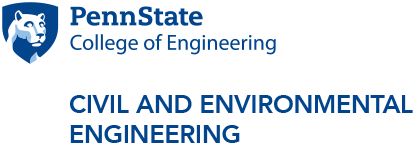
Transportation Engineering Research
We are finding ways to make our transportation systems safer, smarter, and more connected.
Faculty in this area focus on:
- Autonomous Vehicles
- Connected vehicle-based traffic control
- Curbside management
- Electric vehicles
- Geometric design
- Human factors/driver behavior
- Infrastructure management
- Multimodal operations
- Shared mobility systems
- Speed management
- Traffic operations
- Transportation demand management
- Transportation network modeling
- Transportation policy
- Transportation safety
- Urban freight
- Urban mobility
Penn State transportation engineering faculty conduct a vigorous research program. More information about research contracts and grants, including project titles and principal investigators, is listed below.
AI-enabled fiscally constrained life-cycle asset management for infrastructure systems (co-PIs: Guler and Gayah). Center for Integrated Asset Management for Multi-model Transportation Infrastructure Systems, February 2020 – August 2021, $122,000.
An AI based data-driven approach to predict infrastructure condition from multi-sensory nondestructive evaluation data (PI: Guler). Institute for Computational and Data Sciences Seed Grant, May 2021 – May 2022, $24,975.
CAREER: Multi-scale models of urban congestion dynamics to support advanced congestion management strategies (PI: Gayah). National Science Foundation, May 2018 – April 2023, $500,000.
Center for Integrated Asset Management for Multi-model Transportation Infrastructure Systems (PI: Donnell; co-PI: Rajabipour). US Department of Transportation. October 2018 – September 2024, $16,500,000 (excluding matching funds).
Collaborative research: Economic modeling and control methods for Next Generation carpool services (PI: Gayah). National Science Foundation, May 2021 – April 2024, $200,309.
Development of Crash Modification Factors program: Focus crash and facility type workshops (PI: Donnell, co-PI: Gayah). Federal Highway Administration via VHB, Inc., June 2021 – December 2021, $25,265.
Interpretable machine learning methods for road crash frequency prediction (PI: Gayah, Madduri). Institute for Computational and Data Sciences Seed Grant, May 2021 – May 2022, $24,612.
Microsimulation of emergency evacuation of Bear Lake and Wild Basin in Rocky Mountain National Park (co-PI: Gayah), National Park Service, June 2020 – June 2021, $45,300.
Optimization framework for infrastructure management considering traffic safety costs (PI: Guler, co-PI: Gayah). Center for Integrated Asset Management for Multi-model Transportation Infrastructure Systems, June 2020 – December 2021, $95,000.
Pedestrian and Bicycle Safety Performance Functions for the Highway Safety Manual (PI: Guler, co-PI: Gayah). National Cooperative Highway Research Program (NCHRP) Project 17-84 via MRI Global, March 2017 – August 2021, $176,312.
Quantification of systemic risk factors for pedestrian safety on North Carolina roadways (PI: Gayah, co-PI: Guler). North Carolina Department of Transportation, August 2021 – November 2022, $166,328.
Safe Integration of Autonomous Vehicles in Work Zones (PSU co-PIs: Gayah, Guler). US Department of Transportation via HNTB Corporation, January 2021 – December 2024, $1,479,408.
Safety Performance of Part-time Shoulder Use on Freeways (PI: Donnell; co-PI: Gayah). National Cooperative Highway Research Program (NCHRP) Project 17-89 via Kittelson & Associates. July 2018 – July 2021, $45,000.
SMART Intersection multimodal safety countermeasure study (PI: Guler, co-PI: Gayah). PennDOT via Kittleson & Associates, October 2020 – August 2021, $65,709.
Update of the Policy on Geometric Design of Highways and Streets Guidance on Acceleration/Deceleration and Stopping Sight Distance Criteria (PI: Donnell, co-PI: Guler). National Cooperative Highway Research Program (NCHRP) Project 15-75 via Michigan State University, September 1, 2020 – March 2023, $125,000.



